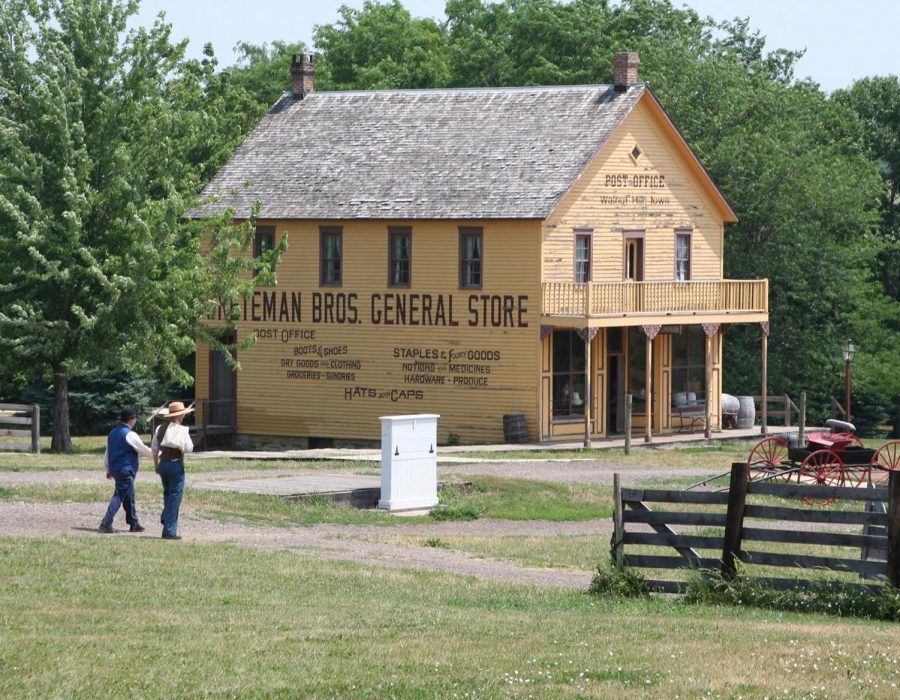A case for funding public history
Opinion columnist Kevin Wiggins makes a case for the importance of the funding of public history regardless of political party. Pictured: A replica of an early Iowa farm village at Living History Farms.
Apr 4, 2019
The case for the funding of public history institutions is one that is often bogged down and mired by the usual hubbub of our political life. Some hear the word “public” in the name and instantly examine it as a utility with material limitations, such as gas lines or infrastructure. Others immediately reject its importance wholesale, given their own assumptions of progress. I argue that “public,” or rather, local, and better said, “living” history, is easily one of the most important and necessary tools for society and these institutions deserve our support.
Firstly, I would turn to the semantic problem which “public” history creates. The word public implies a socially held utility – one that is under the purview of government attentions. This opens the door up for two points of engagement from my friends on the right. The first, also the most obvious contention that they would raise, is the economic cost. Why should an already fattened, scatological tax burden be further extended for this or that museum? This is a fair point which I will address below, but it is so often dismissed by those “cultured” elect among us.
The second avenue which the right will present is one which is dynamic and philosophically driven. It is also one justly raised by liberals and progressives. Public implies a collective “us,” which is a dangerous water Americans have yet to successfully navigate. I am not going to flesh out the left and right’s schismatic arguments presented here for lack of space, but they share something in common. This common concern is with the “how” and “who” that is presented in the “us.” So then, these difficulties said, why is public history even important? If we can’t agree at all then what’s the point?
To explain this, allow me a trip into the anecdotal. I have had the immense privilege of working at Living History Farms (LHF) for the past six years. I’ve worked on everything from blacksmithing to building houses to farming, just like the Iowan did in the 1700’s. All of this in historically correct settings, clothing and environment. My job in the summer is basically playing a real-life video game, and I absolutely love it. LHF has a special part of my soul that nowhere else ever will. It gives meaning and purpose to the people who work there. Our shared love of history brings together people as diverse as a Democratic Socialist Activist, a Reaganite ex-lawyer, a progressive farmer and myself all working side by side.
Alongside my coworkers, we’ve had hours long conversations with people from as far flung places as Germany, South Africa, Ghana, Romania, Kazakhstan, Russia and every American state. These travelers run the gamut from a Berkeley history professor, German hikers, a Kazakhstani John Deere fanatic and Ghanan engineers. This diverse cast of visitors is paired alongside as many as some 20,000 Iowa students who are all immersed in the amazing, living history of Iowa at LHF. Few things seem more valuable to me than providing to the public a story of this amazing place we call home.
Public history institutions show us how the places we call home have influenced the world as we live in, and they deserve our support. Did you know that Iowa had female blacksmiths in the 1800’s? These women owned and operated their own businesses, often successfully. The first female lawyer in the U.S. passed the bar in Iowa in 1869 and we were the first state to mandate the desegregation of schools in 1868. One of the cofounders of the ancestor organization to the NAACP is from Iowa and we used to be one of the largest coalmining states in the US, but so goes the conception that “Iowa is boring we don’t have any interesting history at all.”
“Local” history not only makes the past vibrant, it illuminates not just how, but why we are where we are in the now. It is utterly impossible to understand our place in the now without the how, which public history institutions are in a prime position to answer. We are a part of the process of happening and we cannot truly know anything now without the past. Without the past, we know nothing of what makes us great. What is more, we will not be able to correct for the sins of the past which carry on into the present. The human tendency to forget is what terrifies me most for the future, but we must remember the local happenings which allowed for the existence of great humans. The story of us begins from the ground up, with the local lives of common people. May we never forget that.
















